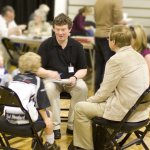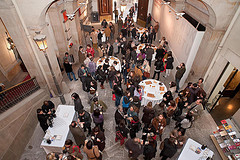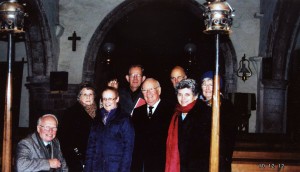Here is the text for my presentation to the JISC New Strategies for Digital Content Conference (London, March 2011) to mark the end of the e-Content programme 2009-11. The slides can also be downloaded from the RunCoCo website as PDF.
RunCoCo: How to run a community collection online, presentation by Alun Edwards , OUCS, University of Oxford, 18 March 2011. RunCoCo: http://runcoco.oucs.ox.ac.uk.
My name is Alun Edwards. I’m project manager of RunCoCo: How to run a community collection online, and I’m here with my colleague Dr Ylva Berglund Prytz. We’re based at the University of Oxford. In our department at Oxford we’ve 5 years experience in running community contributed collections (and actually 10 years ago we were running secret photography and flash-mob kinds of digitisation) so you can see we’ve a passion for the subject.
In 2010-11 the RunCoCo project team has played a key role in supporting and promoting this new way of working with the public. Here you can see a just a snapshot of our activities this year:
- Training, support, networking, e.g.
- Two-way engagement on Twitter: @RunCoCo
- And our series of workshops finishes this May with: Beyond Collections Crowdsourcing for public engagement; free conference, University of Oxford 26 May 2011. We’ve an exciting range of speakers. Registration opens soon!
- Maintained momentum with the blog
- Disseminated key software tools, methodologies, and work-flows developed under The Great War Archive and beyond. Developed an open source system (called CoCoCo) to collect digital objects
So to try to answer Alastair Dunning’s (JISC Programme Manager) brief for these presentations I’ve distilled our work into three strategies to help you crowdsource with sustainable success – A, B, and C:
- Aim for two-way engagement
- Be part of your community
- Challenge your assumptions.
To crowdsource with sustainable success is not easy, but our three strategies are:
- A: Two-way engagement means you as the institution or you as the project team must work with your community as soon as your project is thought of: when you’re arranging funding; when you’re planning and when executing your plan. The picture (below) is a volunteer in Hull interviewing a family who have come along to contribute to a submissions day for The Great War Archive which we ran in 2008. The volunteer is an amateur historian, a genealogist, and a history reenactor, he’s also a local politician who was passionate about the sacrifice his city made. At every stage we involved him and people like him in our project.

- B: The same goes for a community collection that was run in 2010 as part of RunCoCo. This was called Woruldhord. From 400 individuals and museums they collected 4,500 objects for teaching and learning relating to the Anglo-Saxons. The public uploaded this material and added much of the catalogue metadata themselves. The project was lead by a Professor in Old English who is already using all available channels to be part of his community. These include social networking. On Facebook the project is engaging in real conversation, conversing with interested parties. It’s surprising how people do engage on a site like Facebook and if you suspect you have any potential users online in these networks, then that is where you must be – you should try to be where your users are!
- B: If you think how you might successfully use your time at a conference like today, one of the most productive in terms of effort and enjoyment are the breaks. Yes, you can use Facebook as a broadcast channel – and yes people who LIKE your page are going to see your announcements about Old English or whatever alongside the pictures of their friend’s cats – but the value from using social networks is when you treat them like the exhibition hall at a conference, and engage with people.
- C: Finally, Challenge assumptions. We ran The Great War Archive from a perspective of teaching and learning, and to create a rich research resource for students. We know from the enquiries we receive every week that the Archive is also heavily used for family history. It’s often difficult to tell if your work has had an impact – if you have made a difference?
- An example of the impact of The Great War Archive can be seen when we were recently contacted by the organisers of a service to commemorate the 90th anniversary of the dedication of a parish war memorial. They had traced most of the families represented on the memorial except one (a Private Cole) which had left the area leaving no traces. Using Google they had found that material relating to Private Cole had fortunately been contributed to our online Archive by descendents now living in France. The organisers made contact with the family. In December 2010 some of the material was used in an exhibition and in the order of service, and a poem written by Cole’s father (which was contributed to the Archive) was read out by the local MP. Most importantly – the Cole family from across the UK were invited to the service, and about 10 actually made it. When we were sent these photos by the family they explained that:
“None of us would have known about the service without The Great War Archive”
- Challenge assumptions – there may be few in the UK who realise that during WW1 the Germans (for example) went through exactly the same experiences as the British ‘Tommy’. We are currently running a community collection in Europe (starting in Germany later this month) to encourage the public to upload material they hold relating to the First World War. Which will be a small challenge!


[…] The RunCoCo presentation slides can be downloaded from the project website as PDF, and there is a blog about that presentation. Hot air extractor in the ceiling of the Large Common […]